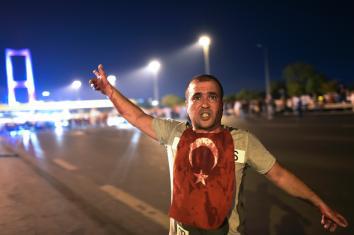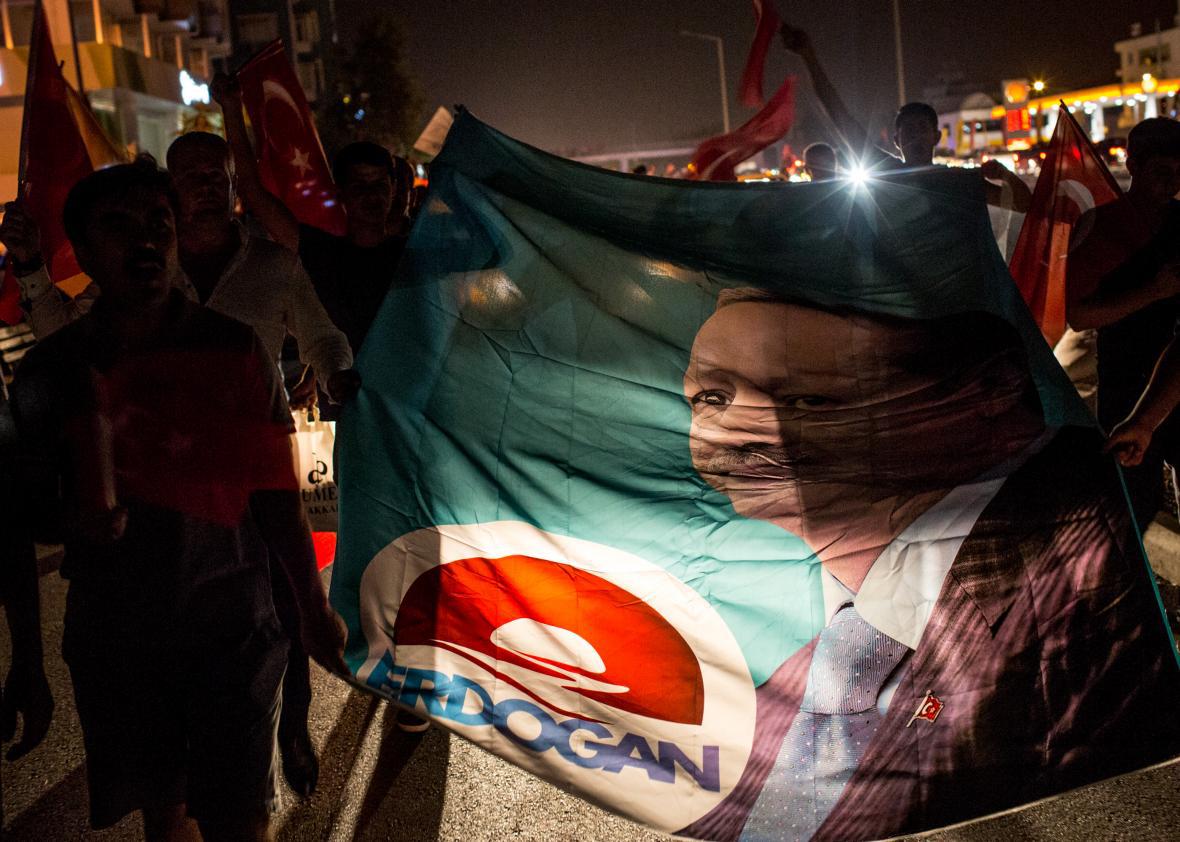On Friday, a coup attempt by elements of the Turkish military—the longtime adversaries of Recep Tayyip Erdogan, the country’s demagogic (but democratically elected) president—plunged Turkey into uncertainty and violence. Details were still sketchy and evolving this evening, with the president, and even much of Turkey’s increasingly repressed opposition, speaking out against the attack on the country’s civilian government, which has been overthrown at other times over the past 65 years. By early Saturday morning in Turkey, the government was claiming that the coup attempt had been foiled, even as reports of violence continued to proliferate.
To discuss these events, I spoke by phone Friday evening with Jenny White, a professor at Stockholm University’s Institute for Turkish Studies; White has also written several books about the region. During the course of our conversation, which has been edited and condensed, we talked about the Turkish military’s history of interfering in democracy, religious conflict in the country, and why a successful coup could lead to civil war.
The typical way of talking about civilian-military conflict in Turkey is religious civilians vs. secular generals. Do you agree with that characterization when looking at Turkish history?
The generals are Kemalists. They are not secularists. Neither side is secularist. Secularism means that there is a differentiation between church and state. In Turkey it is laicist but gets translated as secularist, which muddies the issue. Kemalists controlled religion in society and preferred Sunnis. I hate using secular because it makes it sounds like they are the good guys and everyone else is bad.
The first real election was in 1950, and the moment that happened all the parties, including [first Turkish President Mustafa Kemal] Atatürk’s, had to start pandering to religion to get people to vote for them. They started opening preacher-training schools. They did those sorts of things because otherwise no one would vote for you other than the elites in the cities. The population is primarily conservative. The army, because of this, has always been its own world. It has its own living quarters and schools. It is a universe devoted to Kemalism, and the army doesn’t like governments doing anything with religion that isn’t under Kemalist control. As soon as they saw too much pandering, they stepped in. The first party that came into power in 1950, the Democrat Party, was not a religious party. It was only vaguely conservative, but there was a coup because the army thought the party had become too autocratic. It was very similar to now. They hanged the prime minister.

Bulent Kilic/AFP/Getty Images
They think of it as recalibrating democracy, but they can’t get rid of pandering to religion because people are conservative. And Erdogan’s Justice and Development Party (AKP) managed to pull that off to such an extent that they now have half the population, in part because that part of the population has been constantly pushed back and disrespected.
How did the relationship between the military and the civilians change over time?
Initially, when Erdogan came to power in 2003, the army was still all-powerful. They still had a position above the government. They had a long-standing organization within the government on which the military and a few politicians sat. That was a conduit through which the military basically told governments what to do. Pretty much every 10 years or so since 1960, there has been a coup through which the military took over and threw out the existing government, either because it was too religious or not seen as capable of running the country. In the case of the 1980 coup, there was a civil war that preceded it.
In each case, after a pretty brutal period of pacifying political actors, with arrests and exiles and hangings, they went back to the barracks and allowed an election to be held. And people participated and often chose a candidate that was not the preferred candidate of the military. The 1980 coup was the last coup that involved tanks. In the meantime, the military tried to push Erdogan’s AKP out a number of times through more subtle means, in one case having to do with a veiled threat on their website. The day before the choosing of the president in 2007, which was the decision of parliament, the military put on its website a memorandum which basically said, If you do this—the AKP wanted Abdullah Gül, whose wife was covered [wore a hijab]—something bad will happen. Everyone understood it to be a threat. People were asking why they were meddling, and in fact, the next day, he was elected president and nothing happened.
How have relations been since that moment?
After that, there was a marked change on the part of the AKP. It was very actively pursuing the EU accession. As part of the accession, the EU required that the military be under the control of the government. The AKP used the process to change the system and do that. The military used to have an unlimited budget with no oversight and they changed. And then, together with the Gülen Movement, they initiated a series of high-profile court cases against the generals. They put a lot of the high-ranking officers in jail. All of the heads of the different forces eventually resigned. And at that point, Erdogan reached back into the chain of command and promoted someone up. The end result of that was that the military chief of staff was loyal to Erdogan. After that there was no more uppity-ness. They were demoralized. There were news reports about serious suicides of lower-ranking officers.
But then the Gülen Movement and the AKP had a huge split, and the AKP officially denounced the Gülen Movement as a terrorist organization. And then the AKP probably realized that it could use the army on its side and essentially said it was the Gülenists who’d done it and that the Gülenists had used fabricated evidence, which people knew at the time. The idea was that the army would now do what Erdogan said.
It seemed for a while that there was more comity, right?
Right, that’s correct. But the military was very much against the peace deal that the government was pursuing with the Kurdistan Workers’ Party (PKK). In a sense it was to please the military that Erdogan changed tactics in the last two years, and the military was let loose on the PKK. The first comments by the prime minister after this happened today was that it wasn’t really a coup but that factions in the army were doing it. The factions he mentioned were Gülenist factions.
In the meantime, the real top news is that Erdogan and the prime minister just called people out on the streets. This is extremely dangerous because 50 percent of the country is devoted to Erdogan and 50 percent despises him. This could turn into a civil war.
Has there ever been a coup against a government that had such widespread support among the population?
No, and this is going to be the main story. In the past, there has always either enough fear to keep people off the streets, or enough respect for the army, which was the most respected organization in Turkey. And it still is in many ways. But in the past, there was not enough opposition because people were not invested enough in any particular leader. This is an entirely new situation. And with the government calling for people to come out, I wouldn’t be surprised if people started throwing themselves in front of tanks.
We talked in our last conversation about Erdogan as less of a hardcore Islamist than a typical Turkish strongman, which is interesting in light of what’s now happening.
Right. The army said, essentially, that they were taking over because the government had created an autocracy. I don’t think they mentioned Islam. They mentioned the legal system. Last week, Erdogan attacked the last two independent courts. In previous coups the army took over because they thought institutions were not working properly or being populated with Islamists. But the institutions were still there. This time, the institutions themselves have been destroyed.
